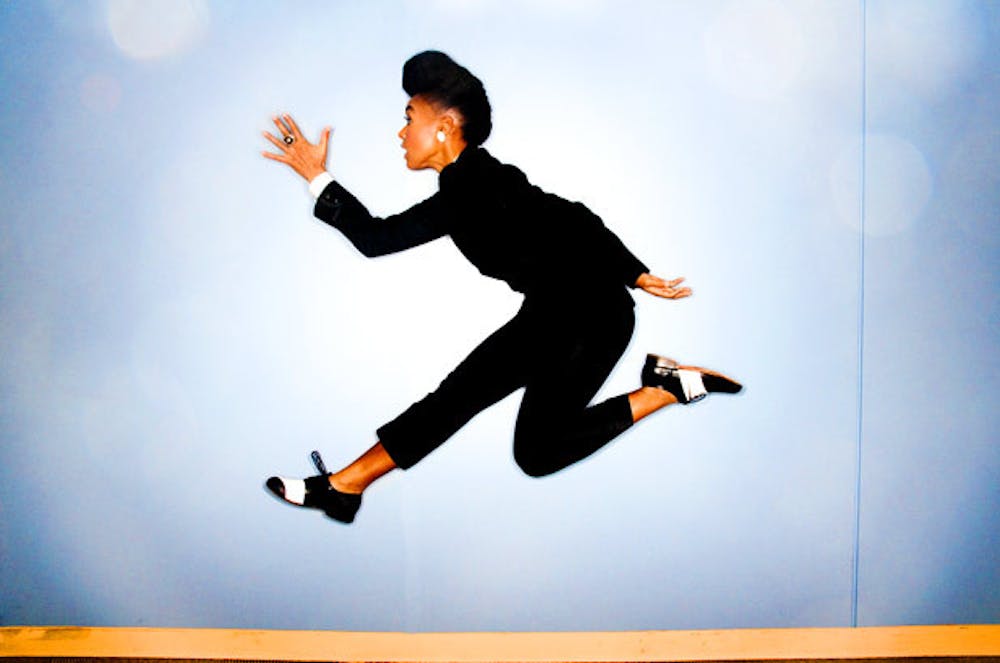As I’m sure you’ve all heard, genre-bending singer and songwriter Janelle Monáe will be performing at the Grand Opera House this Friday, backed with indie pop act fun., as a part of Mercer’s Fall Concert. Her debut album, The ArchAndroid dropped last year and earned a Grammy nomination for Best Contemporary R&B album.
I recently spoke to the bombastic singer over the phone about recording, touring, and performing with her idols. Despite my phone constantly threatening to ruin the entire interview, I think I’ve managed to edit the whole thing into a pretty enjoyable article. Read on.
Eric Brown: So, to start, could you tell me a bit about yourself and tour music for Mercer students that may not be familiar with your work?
Janelle Monáe: Sure. Well, I started off as an up-and-coming artist, and I guess you could still call me that. I formed a partnership with my recording label, the Wondaland Arts Society and Atlantic records. That was made possibly by Sean Combs as well as Big Boi of Outkast. They’re huge supporters of the Wondaland Camp, which is based out of Atlanta, Georgia. They just felt that our ideas should be recognized, and so they helped us get a distribution deal with Atlantic. But we’re still pretty much the main producers behind all the music.
So I’ve worked my way up from an independent artist selling CDs out of my trunk to being at the Grammies this year and performing there. We’ve really just been doing things our way, and we’re not allowing big corporations to push us to do things that they think are popular just to sell records. We focus on teamwork, and we believe in the artists. And I love performing, which is why I’m coming to the school. I want to share the music with you guys. It’s not just a concert or just me showcasing songs as an artist. It’s an experience. I’m coming with the full orchestra, and we’re all just really excited to give you an experience that we truly believe you’ll never forget.
EB: Speaking of performances, you’re known for very big, over-the top concerts. What goes into putting on a show like that?
JM: Well, we’ve on tour for the past few months, which has been amazing. We’ve been with artists from Stevie Wonder to Prince, and we’ve had a lot of time to hone our sets and get the music from the album perfect and learn our covers properly. We love doing covers, because we’re genuinely fans of the bands we cover. We always wish we had written the music ourselves. And we’ve had a good bit of time to focus on those things. So through experience, I believe we’ve been able to cultivate our live show into something special and unique, and now we’re ready to watch it grow. I don’t know exactly how the show will go down at Mercer, because it’s a very organic process, but we plan to make it a special one.
EB: So, what sort
JB: Well, a lot of them are the artists I mentioned before, artists that my band and I cover live: Prince, Stevie Wonder, Michael Jackson, the Jackson Five. All of those artists definitely helped open up doors for us, so we pay homage to them when we need to.
EB: On the ArchAndroid, you worked with Sean Combs and Outkast’s Big Boi. What has that experience like for you?
JM: Well, Big Boi sang on the track “Tightrope,” and Combs executive produced the record, just financially making sure that everything got out there. His big contribution was making sure that we had the funding to record and do our videos and everything like that. Everything, though, was ultimately created and written by myself, Nate “Rocket” Wonder, Chuck Lightning, and Roman GianArthur of Wondaland Productions. It was geat to have their ears working on the project, giving feedback. Ultimately, they were supporters on the project, and maybe not as involved as one would think.
EB: So, you’d say you’re really dedicated to doing as much of the production work as you can by yourself?
JM: Yes, I would.
EB: What goes into the writing process for you?
JM: It varies. A lot of the songs on The ArchAndroid came to me in my dreams. I spent a long time on my iPhone recorder just jotting those notes down, ust a few words or a melody that I find beautiful. I’m in Brazil right now, and I’m looking out at the Atlantic ocean, and I could easily be influenced to write lyrics for the songs I have melodies to. Who knows? There’s not just one real formula to it.
EB: A lot of your songs are very futuristic in their lyrics, dealing with androids and things like that. What inspires you in that regard?
JM: Well, I think there a lot of parallels between androids and the world right now. I think they’re the new “other.” You can parallel that to people treating gay society differently, the way any majority deals with a minority. It has parallels to the way people of African descent were enslaved because of the color of their skin. Or even trying to force people to fall in line with your idea of what is religiously correct. All those things can be paralleled with the android, and that’s why I speak about it. But I believe that once those “others” are integrated into society, we can all get along.





